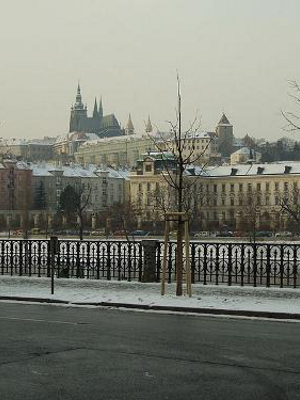In 2013, the Czech Republic will experience its first presidental election. After years of a parliamentary systém, in which the head of state is elected by the deputies, this will be the first time for the Czech people to elect him or her themselves. This not only means a substantial change in the pace of voting for the Czechs but also other unpredictable changes in the distribution of political power in the Republic, changing it into a semi-presidential system, much as in France.
The idea of introducing general suffrage into the presidental election existed among Czech politicians from the first days of the Republic. However, it took twenty years to pass the bill. In part this was because of legislative resistance from some of the founding personalities of the Republic, such as Petr Pithart, who said that from a legal position the introduction of such a feature would lead to unpredictable changes.
On the other hand the parties which declared their support for the „more democratic“ method of choosing the head of state were never really commited to the idea, especially due to the fact that in the local political environment it is always likely that the opposition party would win any election during a parliamentary mid-term. It would take the government party to pass the bill which would probably favor their counter-candidate, instead of comfortably picking their own president thanks to their majority in the parliament.
Only the constant struggle between the coalition partners which make up the contemporary government made the system change possible. All the feuding gangs probably deem it a generally popular step overshadowing their own incompetence. Maybe they even calculated with their incompetence to faint in the glorious aura of ludicrousness of most of the candidates. Who knows?.
Anyway, the trouble is that the Czech political system tended to produce various figures in the last years, some of whom can be classified purely as nightmares, others as living symbols of tainted personal histories of so many middle-aged Czechs, and others who cannot be classified at all due to the lack of signals. Also, the years of parliamentary system created an image of a non-partisan president.
This was already a big problem for the incumbent president Klaus. He, who created the all-mighty and utterly rightist Civic Democratic Party and who made it the ruling party for most of the time in spite of its unambiguously counter-popular ethos, had to accept a non-partisan image too. In a way. He definitely failed to do so, which could be another reason for the MPs to pass the bill. A new system would produce a rather political president which has been the case anyway.
The prevailing image of a non-partisan president seems to favor candidates like the ex-PM´s Fischer and Zeman. Otherwise two examples of the categories stated above. Also the Czech media play this sort of game by continuously publishing opinion polls narrating the story of a tight duel between these two, sometimes accompanied by other exemplary specimens. American economist Švejnar, whose political ideas are largely unknown. President Klaus´ adjutant Jakl. Ex-minister Dlouhý, probably the least popular person in the Czech Republic ever. Self-proclaimed artist and completely tattooed lawyer Franz. Eurosceptic member of the European Parliament Bobošíková, who was driven out of Czech TV by protesters. Then there is the singer Dyk, not fulfilling the condition of proper age and obviously advertising his band via a purposeless candidature. One might go on for quite a long time, naming the even more nameless.
Then there is a different group of candidates. Minister Schwarzenberg, Senate members Sobotka and Dienstbier and European Parliament member Roithová. These represent four of the major parties. Although the media might find it amusing to talk about the first collection for some time, it is more likely that general suffrage will mean an election like any other. That means a political one. As in all countries with a semi-presidential system. The last four candidates represent four of the most influential ideologies, the others just try to cope with some image. It will not be image which will decide the election though. The decisive factor will be, if the contemporary goverment will quit in the meantime, accidentally favoring a rightist candidate, or not, giving carte blanche to Dienstbier as the only oppostion candidate of all.
published: 26. 8. 2012







